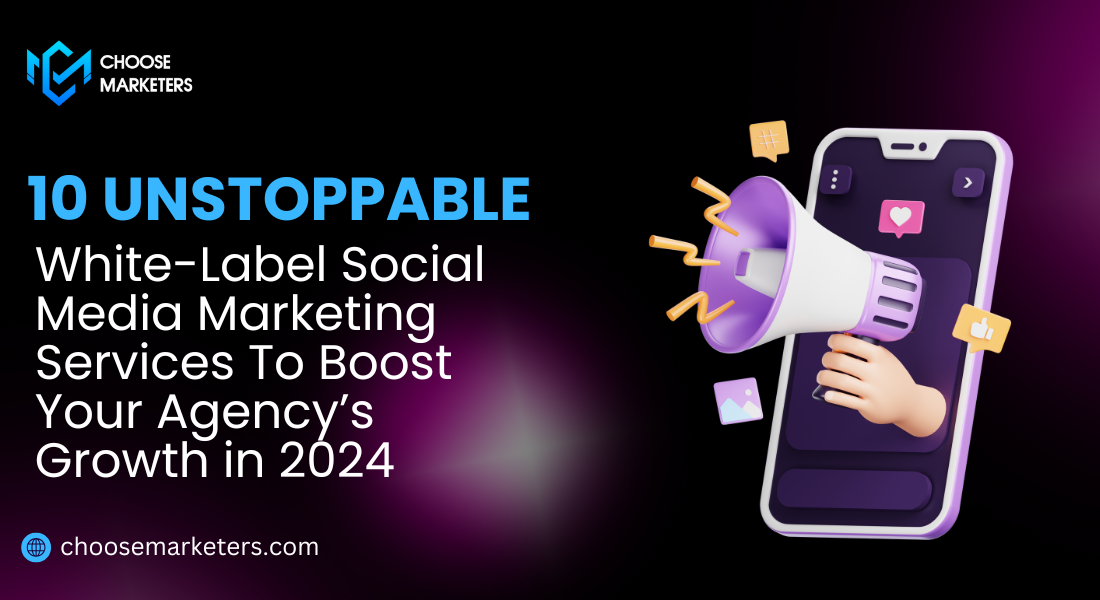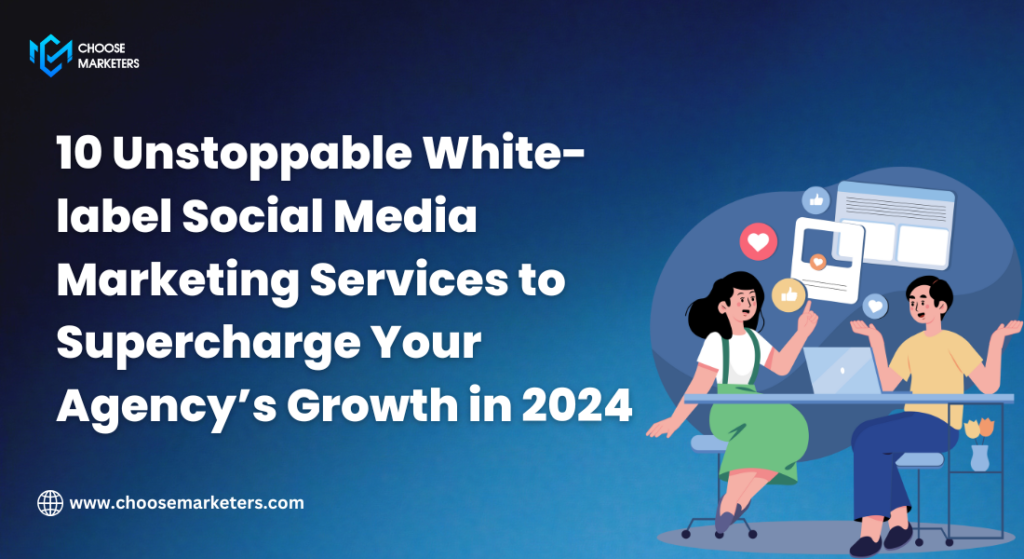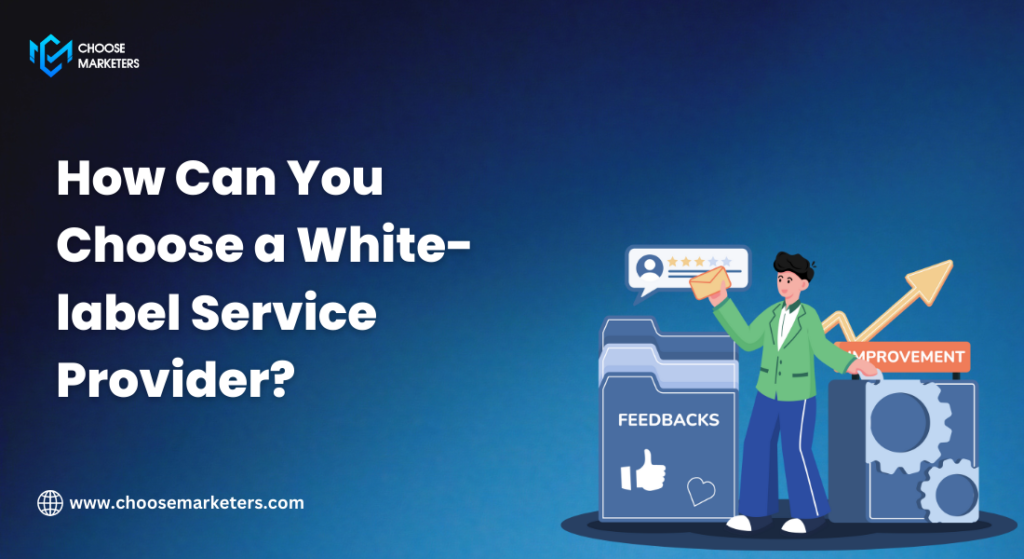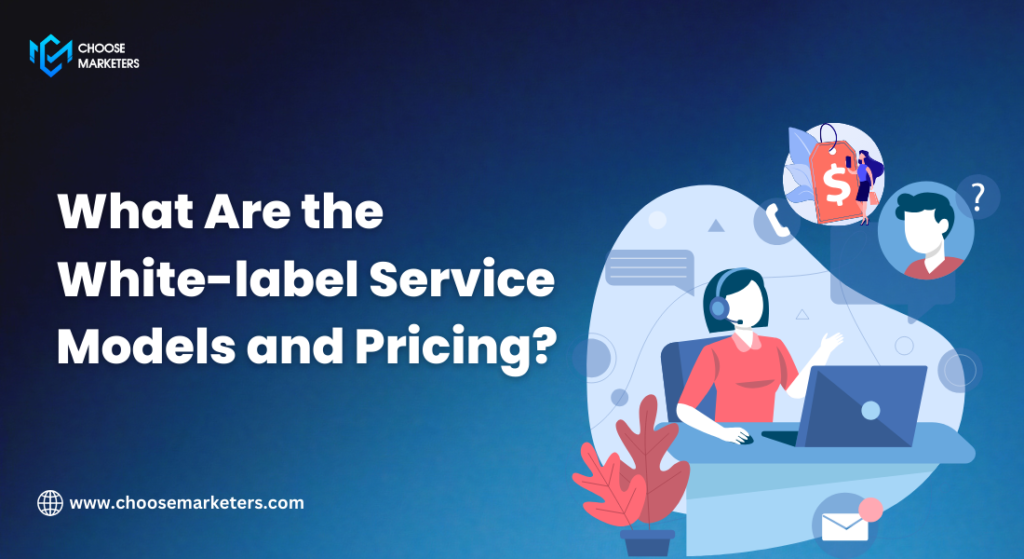

10 White-Label Social Media Services to Grow Your Agency in 2024
White-label social media marketing involves a company (like a marketing agency) using services from a third-party provider to manage social media for clients under their brand name. This model lets agencies deliver professional social media solutions such as content creation, scheduling, and engagement without needing an in-house team to handle every task.

In the U.S., this service is popular for agencies of all sizes, from New York to California, as it offers scalability and cost efficiency. White-label providers manage the technical aspects, while agencies focus on client relationships. This helps U.S.-based businesses expand their offerings, giving clients expert social media support without added overhead.
What Are the Benefits of White Label Social Media Marketing?
White-label social media marketing offers agencies significant advantages, helping them grow while keeping costs manageable. Here are some detailed benefits:
1. Cost Efficiency
Outsourcing social media tasks to White-label providers saves agencies from the expenses of recruiting, training, and managing an in-house team. This is especially beneficial in high-cost states like California or New York, where hiring skilled talent can be expensive. White-label services provide agencies with high-quality work at a fraction of the cost, making it easier to scale profitably.
2. Service Expansion
White-label social media marketing enables agencies to offer new services, such as content creation, social media management, and analytics, without building out their teams. This flexibility is valuable for attracting clients in varied sectors—from tourism in Florida to technology in Texas. Agencies can serve a broader client base without needing in-house expertise in every area, allowing them to expand seamlessly.
3. Consistent Quality
White-label providers are experts in social media marketing, ensuring agencies receive reliable, high-quality content and management services. This consistency helps agencies maintain a strong reputation, especially in competitive markets like Chicago and Los Angeles. Clients feel confident that their social media is managed by professionals, enhancing the agency’s credibility and fostering client satisfaction.
4. Focus on Core Activities
White-label services allow agencies to focus on core tasks like relationship-building, client acquisition, and strategy development. For agencies in high-demand areas, such as Miami or Atlanta, this means more time to grow their client base and craft effective marketing plans, knowing day-to-day social media tasks are managed efficiently.
5. Risk Reduction
With constantly changing algorithms and features, social media platforms can impact campaign success. White-label providers stay on top of these changes, reducing the risk of performance issues due to platform shifts. This is essential for agencies with clients across the U.S., as it ensures that marketing efforts remain effective and up-to-date, giving clients steady results without disruption.
How Does White-label Marketing Support Agencies?
White-label marketing significantly supports agencies by enhancing their service delivery and allowing them to focus on growth. Here’s a deeper look at how it works:
1. Expands Service Offerings
White-label providers enable agencies to offer a diverse range of services, including social media management, content creation, and analytics, without the need to hire specialized teams. This ability to expand services is crucial for agencies wanting to cater to various sectors, whether they are working with tech startups in Silicon Valley or retail businesses in Texas. Agencies can now meet different client needs, providing comprehensive solutions that enhance their appeal.
2. Enhances Brand Image
By using White-label services, agencies can brand these solutions as their own. This capability helps create a seamless experience for clients, who may not even realize a third party is providing the service. A consistent brand image across all services fosters trust and loyalty, which is especially vital in competitive markets like New York and Los Angeles. Clients are more likely to choose an agency that offers a complete package of services, enhancing the agency’s reputation.
3. Improves Client Retention
When agencies can offer a full suite of social media solutions, client satisfaction increases. Clients appreciate having a one-stop shop for their marketing needs, which leads to stronger relationships and higher retention rates. For example, agencies in fast-paced areas such as Miami or Chicago benefit from long-term contracts, allowing them to build deeper connections with clients over time. This not only ensures steady revenue but also creates opportunities for upselling additional services.
4. Boosts Profit Margins
Utilizing White-label providers allows agencies to reduce operational costs while maintaining high service quality. Instead of investing heavily in recruitment and training, agencies can leverage the expertise of external providers. This model is particularly advantageous in regions where labor costs are high, as it allows agencies to take on more clients and projects, ultimately increasing their profit margins. As a result, agencies can grow without the financial strain of expanding their in-house staff.
5. Reduces Operational Workload
White-label marketing significantly decreases the daily workload for agency staff, allowing them to focus on strategic planning and client relationship management. This operational efficiency is especially beneficial for agencies in high-demand areas, as it enables them to allocate more resources toward innovation and client growth strategies rather than routine tasks. With White-label services handling the heavy lifting, agencies can pursue new business opportunities and enhance their service offerings effectively.
How Can You Choose a White-label Service Provider?
When selecting a White-label service provider, agencies should consider several important aspects to ensure they partner with a reliable and effective company.

Here are the main points to evaluate:
Reputation and Experience
Look for providers with a solid reputation and extensive experience in the industry. Check client reviews and case studies to understand their track record. A provider with a strong portfolio demonstrates reliability and expertise, which is crucial for agencies looking to deliver quality services.
Range of Services Offered
Ensure that the White-label provider offers a comprehensive suite of services that aligns with your agency’s needs. This may include social media management, content creation, analytics, and customer support. A one-stop shop for various services allows agencies to cater to diverse client needs without seeking multiple providers.
Customization Options
The ability to customize services is essential. Look for providers that allow agencies to tailor solutions to meet specific client requirements. This flexibility helps agencies maintain their brand identity and ensures that the services align with their overall strategy.
Communication and Support
Effective communication is critical for a successful partnership. Choose a provider that offers excellent customer support and maintains open lines of communication. This ensures that any issues or questions can be addressed promptly, allowing agencies to provide seamless service to their clients.
Pricing Structure
Evaluate the pricing models offered by different providers. It’s important to find a balance between quality and cost-effectiveness. Understanding the pricing structure helps agencies forecast their expenses and set competitive rates for their clients.
Technology and Tools
Assess the technology and tools used by the White-label provider. They should employ up-to-date, user-friendly platforms that enhance service delivery and reporting. The right technology can streamline processes, making it easier for agencies to manage their clients’ needs efficiently.
Scalability
As agencies grow, their service needs may change. Choose a provider that can scale its services to accommodate your agency’s growth. Scalability ensures that you can continue to meet client demands without interruptions or the need to switch providers.
What Are the Top White-label Social Media Marketing Services in 2024?
As businesses increasingly rely on social media, White-label services have become essential for agencies looking to provide quality marketing without stretching their resources. Here are some of the top White-label social media marketing services to consider in 2024:
SocialPilot
SocialPilot is a leading platform known for its intuitive design and robust features. It allows agencies to schedule posts across multiple social media channels, making it easy to manage various client accounts in one place. SocialPilot also provides analytics that help measure engagement, track growth, and optimize strategies. Its content curation tools enable agencies to discover and share relevant content, keeping their client’s social media feeds fresh and engaging.
Pros: User-friendly interface, multi-channel scheduling, effective analytics.
Cons: Some advanced features may require additional payment and limited customization options.
PromoRepublic
PromoRepublic stands out with its extensive library of customizable templates that simplify the post-creation process. Agencies can quickly generate visually appealing content tailored to their client’s brand voice. The platform also includes social listening tools that monitor brand mentions, enabling agencies to respond promptly to customer inquiries and comments. The analytics features help assess performance, providing insights that inform future content strategies and drive engagement.
Pros: Large template library, effective social listening tools, strong analytics.
Cons: Some users find the learning curve steep, with limited features on lower-tier plans.
Veza Digital
Veza Digital emphasizes personalized marketing strategies tailored to each client’s unique needs. They offer comprehensive content creation services that resonate with target audiences, enhancing the effectiveness of social media campaigns. Their community management services foster active engagement, building stronger connections between brands and their customers. By providing detailed performance analytics, Veza Digital ensures agencies can continuously improve their social media strategies and deliver measurable results.
Pros: Tailored strategies, strong community management, detailed analytics.
Cons: May be more expensive than some competitors, with limited availability in certain regions.
Sendible
Sendible is particularly well-regarded for its ability to integrate with various tools and platforms, making it a versatile option for agencies. It enables users to schedule posts, manage client interactions, and analyze performance metrics from a single dashboard. Collaboration features allow team members to work together efficiently, streamlining the workflow. Sendible’s robust reporting capabilities provide actionable insights that help agencies refine their strategies and demonstrate value to clients.
Pros: Excellent integration capabilities, effective collaboration tools, and detailed reporting.
Cons: Can be overwhelming for beginners, higher cost for full feature access.
Vendasta
Vendasta is a comprehensive White-label platform that offers a wide range of services, including social media management and marketing automation. Their platform is designed to enhance agency offerings and improve operational efficiency. With tools for reputation management, Vendasta ensures that brands maintain a positive image across social media channels. The platform’s user-friendly interface allows agencies to quickly adapt and respond to client needs, making it easier to deliver high-quality results.
Pros: Comprehensive suite of services, user-friendly, strong reputation management.
Cons: Can be complex to navigate initially, and may require a learning period.
SEO Reseller
SEO Reseller provides a suite of White-label services focused on integrating social media strategies with overall digital marketing efforts. They offer content creation and management services that align with SEO goals, ensuring that social media campaigns contribute to the broader marketing objectives. This holistic approach helps agencies drive traffic and improve visibility for their clients. Their emphasis on quality content ensures that every social media post resonates with target audiences.
Pros: Integration with SEO, quality content focus, effective traffic driving.
Cons: Limited features in some plans, may require technical expertise for best use.
MixBloom
MixBloom combines social media management with advanced analytics, providing agencies with insights into audience behavior and preferences. Their platform helps agencies understand which strategies are effective, allowing for adjustments that enhance engagement. By focusing on data-driven decision-making, MixBloom supports agencies in crafting content that resonates with audiences and drives results.
Pros: Data-driven insights, effective audience analysis, strong engagement tools.
Cons: Limited user interface options, can be less intuitive for new users.
AgencyPlatform
AgencyPlatform offers a comprehensive set of White-label tools that cater to agencies of all sizes. Their features include content scheduling and performance tracking, which help agencies manage client needs efficiently. The platform’s scalability allows agencies to grow their service offerings without disruptions. By providing a robust suite of tools, AgencyPlatform empowers agencies to deliver high-quality social media marketing services.
Pros: Scalability for growth, efficient management tools, comprehensive offerings.
Cons: Some features may not be available on lower-tier plans, and require time to fully utilize all tools.
Thrive Internet Marketing Agency
Thrive Internet Marketing Agency is a full-service digital marketing firm known for its comprehensive offerings that include search engine optimization (SEO), pay-per-click (PPC) management, and social media marketing. Their team focuses on delivering results-driven strategies tailored to meet individual client needs.
Pros: Custom solutions that cater to specific client goals.
Cons: Higher costs may be prohibitive for smaller businesses.
SociallyIn
SociallyIn specializes in social media marketing and content creation, focusing on helping brands engage their audience through creative strategies. They leverage data-driven insights to enhance their campaigns, ensuring that content resonates with the target market.
Pros: Innovative content strategies enhance brand engagement.
Cons: Infrequent client meetings may affect communication.
Unlayer
Unlayer is a white-label design platform that specializes in helping agencies create customizable email and landing page templates. Their user-friendly interface allows marketers to produce visually appealing content quickly and efficiently.
Pros: Easy-to-use interface saves time on design processes.
Cons: Limited design features may not meet complex graphic needs.
What Are the White-label Service Models and Pricing?
Understanding White-label service models and pricing structures is essential for agencies aiming to select the right service provider. Different models cater to various needs and budgets, allowing agencies to find the best fit for their clients.

1. Monthly Subscription Model
This is one of the most common pricing structures, where agencies pay a fixed monthly fee to access a suite of services. This model typically includes a range of features such as social media scheduling, content creation, and analytics reporting. Monthly subscriptions offer predictability in budgeting and allow agencies to scale their services as their client base grows.
2. Pay-as-You-Go Model
In this model, agencies pay for services only when needed. This flexibility can be beneficial for smaller agencies or those with fluctuating workloads. The pay-as-you-go model allows for precise budgeting, as agencies only spend money on specific services when they require them, making it a cost-effective option for those just starting or managing seasonal clients.
3. Tiered Pricing Model
Many White-label providers offer tiered pricing based on the level of service required. Each tier usually includes different features and limits, allowing agencies to choose a plan that aligns with their needs. Higher tiers often come with advanced features, such as increased posting limits, enhanced analytics, and priority support. This model enables agencies to upgrade their services as their needs grow without switching providers.
4. Customized Pricing Model
Some providers offer tailored pricing structures based on the specific needs of an agency. This model allows for greater flexibility in service offerings, making it suitable for larger agencies with unique requirements. Customized pricing can also include bundled services, combining social media management with other marketing solutions, ensuring agencies receive a comprehensive package that meets their client’s needs.
5. Revenue Share Model
In this model, agencies pay a lower upfront cost but share a percentage of the revenue generated from the White-label services. This arrangement can be beneficial for agencies that are confident in their ability to drive results. The revenue share model aligns the interests of both the agency and the service provider, fostering a partnership focused on achieving success.
Pricing Considerations
When evaluating White-label social media marketing services, agencies should consider several factors related to pricing:
- Features Included: Determine which features are essential for your clients and ensure the chosen plan offers them.
- Scalability: Consider how easily you can upgrade or change your plan as your agency grows.
- Contract Terms: Check for any long-term commitments or cancellation fees, which can affect your budget.
- Hidden Costs: Be aware of potential additional charges for services such as extra posts, reports, or consultations.
- Trial Periods: Some providers offer free trials or money-back guarantees, allowing agencies to test the service before committing fully.
How to Integrate White-label Solutions into Your Workflow?
Integrating White-label solutions into your agency’s workflow can enhance efficiency and improve service delivery.

Here’s a straightforward approach to ensure a smooth transition and maximize the benefits of White-label social media marketing:
Assess Your Needs
Before selecting a White-label service, evaluate your agency’s specific needs. Identify the services you want to offer, such as content creation, scheduling, or analytics. Understanding your goals helps you choose a provider that aligns with your vision and client expectations.
Choose the Right Provider
Selecting a White-label provider is crucial. Look for one that offers reliable support, comprehensive features, and a good reputation. Check reviews and request demos to ensure their platform fits your agency’s requirements.
Train Your Team
Once you’ve selected a provider, train your team on how to use the White-label solutions effectively. Familiarize them with the platform’s features, workflow processes, and reporting tools. This training ensures everyone can utilize the system efficiently, leading to better results for your clients.
Streamline Communication
Establish clear communication channels within your team and with the White-label provider. This will help you manage client expectations, share updates, and address issues promptly. Utilize project management tools to keep track of tasks and deadlines, ensuring everyone is on the same page.
Create a Workflow Process
Develop a structured workflow that incorporates the White-label services. This may include processes for content creation, approval, scheduling, and performance tracking. Documenting your workflow will help standardize operations, making it easier for team members to follow and ensuring consistency in service delivery.
Monitor Performance
Regularly evaluate the performance of the White-label services. Use analytics tools provided by your service partner to assess engagement, reach, and conversion rates. This data will help you make informed decisions about future strategies and improve your overall service offerings.
Solicit Client Feedback
Engage with your clients to gather feedback on the White-label services provided. Understanding their experiences and expectations will help you refine your approach and enhance client satisfaction. Use this feedback to make adjustments to your workflow or service offerings.
Scale as Needed
As your agency grows, be prepared to scale your White-label services. Many providers offer flexible plans, allowing you to expand service offerings without significant investment in additional resources. Keep an eye on your agency’s growth and adapt your service models accordingly.
How Does White-label Social Media Marketing Operate in Different States Across the USA?
When considering White-label social media marketing, it’s beneficial to understand how it operates in different states across the USA. Here are ten states where White-label services are thriving, each offering unique opportunities for agencies:
California
As a tech hub, California is home to many digital marketing agencies that leverage White-label solutions to enhance their service offerings. The competitive landscape encourages agencies to adopt innovative marketing strategies, making White-label services a popular choice for scalability and expertise.
New York
Known for its fast-paced business environment, New York agencies often utilize White-label services to keep up with the high demand for specialized social media marketing. The city’s diverse industries require tailored strategies, and White-label solutions provide the flexibility to meet client expectations effectively.
Texas
With a growing number of startups and established businesses, Texas agencies use White-label marketing to efficiently scale their operations. The state’s business-friendly climate fosters innovation, allowing agencies to experiment with new marketing tactics without the heavy investment of in-house development.
Florida
The diverse population in Florida creates a rich market for customized social media strategies. Agencies in this state leverage White-label services to cater to various cultural demographics, ensuring that their marketing approaches resonate with different audiences across the state.
Illinois
Chicago’s vibrant marketing scene benefits from White-label solutions that allow agencies to offer specialized services without the burden of extensive in-house resources. Agencies can focus on their core competencies while relying on trusted partners for social media management.
Washington
Home to numerous tech companies and startups, agencies in Washington utilize White-label providers to access advanced marketing tools and resources. The tech-savvy environment encourages agencies to stay at the forefront of digital marketing trends by outsourcing non-core activities.
Massachusetts
Known for its innovation and education sectors, agencies in Massachusetts are adopting White-label services to remain competitive in the digital landscape. The state’s focus on technology and research allows agencies to implement cutting-edge marketing strategies through partnerships with White-label providers.
Virginia
With a strong business community, particularly in Northern Virginia, agencies here rely on White-label marketing to enhance their offerings and attract clients. The presence of various industries creates opportunities for tailored social media strategies that meet specific client needs.
Arizona
The growing economy in Arizona allows agencies to explore White-label solutions for expanding their service capabilities. The state’s business landscape encourages collaboration between agencies and White-label providers to deliver effective social media marketing services to local businesses.
Colorado
Colorado’s focus on startups and entrepreneurship makes White-label services essential for agencies looking to scale quickly. The collaborative culture in cities like Denver and Boulder fosters partnerships that enable agencies to deliver high-quality marketing solutions without the overhead of building an in-house team.
How Can You Customize Content with White-label Solutions?
Customizing content is a crucial aspect of effective White-label social media marketing. It allows agencies to tailor their messaging to meet the specific needs and preferences of their clients. Here’s how to effectively customize content using White-label solutions:
1. Understand Client Branding
Before creating content, it’s essential to grasp your client’s brand identity, including their voice, style, and messaging. Review existing brand guidelines, logos, and previous social media posts to ensure consistency. This understanding will help you create personalized content that aligns with your brand.
2. Leverage Content Creation Tools
Many White-label providers offer robust content creation tools that allow agencies to design and customize posts easily. Utilize templates and features that let you adjust graphics, text, and layouts. This capability can help you maintain a consistent brand look while also making the content unique to each client.
3. Incorporate Client Input
Engage with your clients during the content creation process. Solicit their ideas, preferences, and any specific topics they want to highlight. Incorporating their feedback ensures the content resonates with their audience and meets their expectations.
4. Utilize Analytics for Insights
White-label solutions often provide analytics tools to track engagement and performance. Use these insights to understand what content works best for each client’s audience. Analyzing past performance helps you refine future content, making it more relevant and impactful.
5. Adjust for Different Platforms
Each social media platform has its own unique audience and content format. Tailor your content for the specific platforms your clients use, whether it’s Instagram, Facebook, Twitter, or LinkedIn. Ensure that the messaging and visuals align with platform-specific trends and user behavior for maximum effectiveness.
6. Schedule and Plan Ahead
Utilize the scheduling features of your White-label solution to plan content. This allows you to create themed campaigns or coordinate messages across multiple platforms, ensuring that your client’s branding remains consistent and strategic over time.
7. Keep Content Fresh
Regularly update and refresh content to keep it engaging. Use seasonal themes, trending topics, or industry news to create timely posts that capture the audience’s interest. This ongoing effort will help maintain audience engagement and enhance the client’s online presence.
What Are the Pros and Cons of White-label Social Media Marketing?
Understanding the pros and cons of White-label social media marketing helps agencies make informed decisions when integrating these services into their offerings.
Here are the key advantages and disadvantages:
Pros of White-label Social Media Marketing
- Scalability: White-label solutions allow agencies to easily scale their services without the need for hiring additional staff. Agencies can expand their offerings quickly to accommodate more clients.
- Cost-Effective: By using White-label services, agencies can save on costs associated with developing in-house capabilities. This model often reduces overhead and allows agencies to focus their resources on client acquisition and retention.
- Access to Expertise: White-label providers typically have a team of experts in social media marketing. Agencies can leverage this expertise without needing to invest in specialized training for their staff.
- Time Savings: Utilizing pre-built tools and templates allows agencies to save time on content creation and campaign management. This efficiency enables them to focus on strategy and client relationships.
- Branding Flexibility: Agencies can customize the services to reflect their branding while providing high-quality marketing solutions. This flexibility allows for personalized client experiences.
Cons of White-label Social Media Marketing
- Dependency on Providers: Relying on a third-party provider can lead to challenges if the service experiences downtime or fails to meet expectations. Agencies must choose reputable providers to mitigate this risk.
- Limited Control: Agencies may have limited control over the services offered, which can affect customization and responsiveness to client needs. It’s essential to select a provider that allows for sufficient flexibility.
- Quality Variability: Not all White-label providers offer the same quality of service. Agencies must thoroughly vet potential partners to ensure they deliver the desired results for clients.
- Less Brand Ownership: While White-label solutions allow for branding, the agency may not fully own the services provided. This can impact the perceived value of the agency’s offerings.
- Potential for Misalignment: If the White-label provider’s strategies do not align with the agency’s goals, it could lead to inconsistencies in client service and results.
Frequently Asked Questions (FAQs)
1. What is White-label social media marketing?
White-label social media marketing involves agencies outsourcing their social media management to third-party providers. These providers create and manage content that agencies can rebrand as their own. This allows agencies to offer comprehensive social media services without needing in-house expertise or resources.
2. How can agencies benefit from White-label solutions?
Agencies can save time and costs by using White-label solutions, allowing them to focus on client relationships and business growth. They gain access to expert services, scalable options, and the ability to quickly adapt to client needs without the overhead of building an in-house team.
3. What should I look for in a White-label service provider?
When choosing a White-label service provider, agencies should consider the provider’s reputation, range of services, pricing structure, and customer support. It’s important to ensure they can offer customized solutions that align with the agency’s brand and client requirements.
4. Are there risks associated with White-label social media marketing?
Yes, there are potential risks, including dependency on the provider for service quality and availability. Agencies may also face challenges if the provider’s strategies do not align with their brand values or client expectations, which can lead to inconsistencies in service delivery.
5. How do I start with White-label social media marketing?
To start, agencies should research potential White-label providers, assess their offerings, and select one that fits their needs. Once a partnership is established, agencies can begin integrating the services into their marketing strategy, ensuring that they maintain their branding and communication style.

